Onkar Singh/Vicky Nanjappa in New Delhi/Lucknow
The Supreme Court on Thursday stayed for a week the Ayodhya title suit verdict that was due to be pronounced by the Allahabad High Court on Friday, and will hear the plea for deferment of the judgement next Tuesday.
A bench comprising Justices R V Raveendran and H L Gokhale gave a patient hearing to the petition filed by Ramesh Chand Tripathi that the judgement may have repercussions on the law and order situation on the country no matter which side the judgement favoured.
The two judges of court no 3 heard the matter for over 40 minutes before passing the order.
The court bench will now hear the deferment plea on September 28.
"Even if there is one per cent chance of negotiations one must give it a chance," Justice Raveendran said.
...
Additional Inputs: PTI
SC defers Ayodhya title verdict by a week
The court issued notices to the contesting parties on the petition filed by retired bureaucrat Tripathi challenging the order of the Lucknow bench of the Allahabad high court refusing to defer the verdict in the 60-year-old Ram Janambhoomi-Babri Masjid title suit dispute.
The bench stayed the verdict following conflicting views over the issue of entertaining the petition challenging the high court order.
Justice Raveendran was of the view that the special leave petition should be dismissed while Justice Gokhale, on the other hand, was of the opinion that a notice should be issued for exploring the option of settlement.
However, Justice Raveendran, who was heading the bench, preferred to go by the opinion of Justice Gokhale.
In the order, Justice Raveendran said, "When one of the judges has a difference of opinion then the tradition is to issue notice."
SC defers Ayodhya title verdict by a week
The Supreme Court also sent a notice to the Attorney General.
The apex court verdict has evoked mixed reactions.
Babri Masjid Committee Convenor Dr S Q R Ilyas says that the decision to stay the pronouncement of the verdict has come as a shock since for the first time such a verdict has been pronounced despite both the parties not wanting any deferment.
Both parties had made it clear that the court should go ahead with the verdict and there is no scope for any further argument.
"Even when the Supreme Court hears the matter next week, our answers will be the same and it cannot be compromised at this stage. It has not happened in 60 years and overnight it will not happen. There have been many attempts made in the past to settle the matter but they have all failed," he said.
SC defers Ayodhya title verdict by a week
Even during the last hearing of the high court both parties had voiced in the same concern and it was based on this the verdict not to defer the plea was passed.
"This looks like just another tactic to delay proceedings and if the matter is not settled by September 30, one of the judges on the bench will retire and the matter will have to be re-heard."
"When we go before the Supreme Court next week we will seek speedy disposal of the case so that the pronouncement can go ahead," he added.
On Wednesday, a bench of the apex court comprising Justices Altmas Kabir and A K Patnaik had declined to hear urgently the plea to postpone the Ayodhya title suit verdict.
While refusing to hear the petition filed by retired bureaucrat Tripathi, the bench had said that it did not have the "determination" to take up the issue and added that it will be listed before another bench.
SC defers Ayodhya title verdict by a week
Mukul Rohatgi, senior counsel appearing for Tripathi, said the Supreme Court may give a healing touch by attempting a last-ditch effort at mediation.
He said it was possible that in the face of Supreme Court notices the rival parties may sit across to find an amicable solution.
Rohatgi said that next Tuesday his side would try to tell the court that the matter of judgement should be deferred so that religious, political and national leaders could try and work out a solution.
He also said it was not a matter of just 10 or 20 parties in the case but related to lakhs and crores of people and the mediation could result in some way out.
Tripathi had on Wednesday moved the apex court five days after the high court's Lucknow bench rejected his petition for deferring the verdict and to allow mediation to find a solution to the contentious dispute.
SC defers Ayodhya title verdict by a week
The Allahabad high court had also imposed "exemplary costs" of Rs 50,000, terming Tripathi's effort for an out-of-court settlement of the dispute as a "mischievous attempt".
The petition filed by Tripathi sought some time to allow mediation among the parties and also challenged the costs. Tripathi, in his plea before the apex court, claimed that the verdict might disturb communal harmony and lead to violence in the country.
In the petition filed through advocate Sunil Jain, he cited several reasons for deferment of the verdict, which he said would be in "public interest" in view of the apprehension of communal flare up, upcoming Commonwealth Games, elections in Bihar and violence in Kashmir Valley and Naxal-hit states.
The petition had feared that there would be inadequate security personnel in Uttar Pradesh to provide security.
SC defers Ayodhya title verdict by a week
Tripathi had also referred to an earlier order of the Court on July 27 last that parties concerned are at liberty to approach the Officer on Special Duty for formation of the bench if there was any possibility of disposal of the dispute or arrival at an understanding through consensus.
One of the three judges in the Lucknow bench, however, disagreed with the majority order of September 17 rejecting the plea for deferring the Ayodhya verdict to allow mediation and gave a dissenting opinion that an amicable settlement could have been explored in the protracted legal wrangle.
Justice Dharam Veer Sharma, while not concurring with the view of the other two judges -- Justice S U Khan and Justice Sudhir Agarwal -- also said in his dissenting judgement that he wasn't consulted when the three-judge bench gave the order while dismissing the plea for mediation.



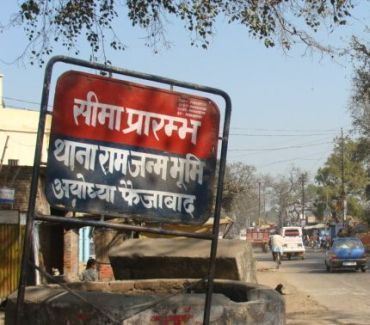
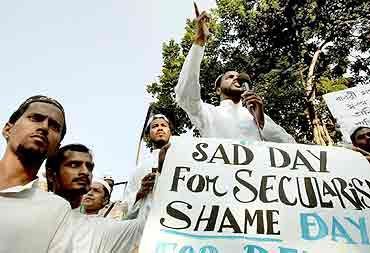
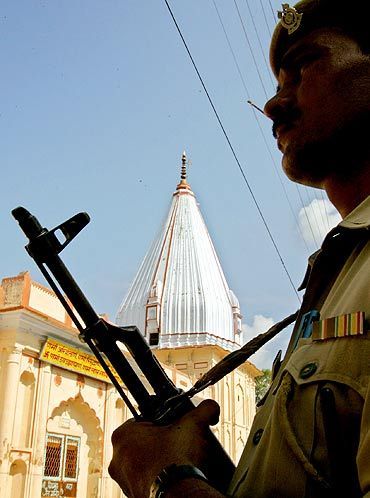
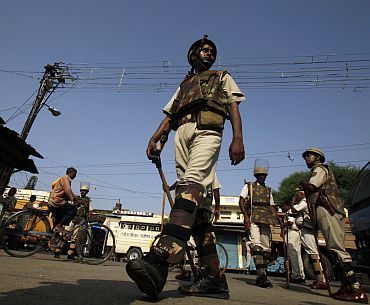
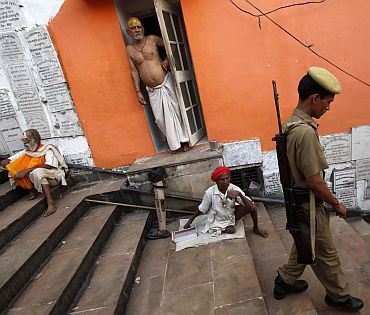
article